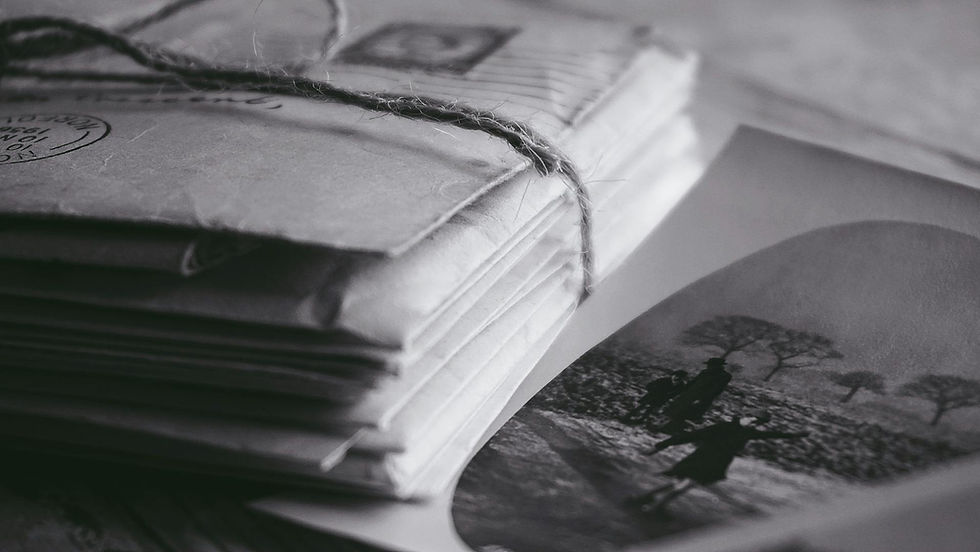Meeting Linda Bastide: A Unique Voice to Tell History
- Isabelle Karamooz

- Dec 23, 2024
- 4 min read
Linda Bastide, a writer, poet, and actress, is a prominent figure in contemporary French literature. With a sensitive pen and a profound respect for historical memory, she is dedicated to uncovering forgotten stories and passing them on to future generations. In her latest book, Les Otages Oubliés (The Forgotten Hostages), she blends historical reality with autobiography to tell a story that is both deeply personal and universally resonant, filled with courage and humanity.
To discover these powerful stories, Les Otages Oubliés is available worldwide, including in the United States, and can be purchased in both French by clicking HERE and English editions HERE.
In this interview, she shares the behind-the-scenes details of her creative process, her inspirations, and the challenges she faced while writing.
Photos 1 & 2: Linda Bastide in her hom in Montmartre, Paris Photo 3: The book's heroine and her baby. Credit: Linda Bastide Archives

FQM: What inspired you to tell this story in the form of a "dual narrative," combining historical reality and personal experience?
Linda Bastide: When my mother-in-law passed away, she left me a trunk filled with photos, drawings, and various letters. While sifting through this treasure trove, I discovered an incredible, almost forgotten story that I felt compelled to share. It was as if Rifka had preserved this legacy for me, as a token of her appreciation for my love for her son.
I also wanted to highlight the ordeal faced by Bernard, my husband, who was separated from his father until the age of five and was himself interned with his mother in a camp. As the daughter of a prominent member of the French Resistance, I felt a moral obligation to tell this story, especially since no one else had written about it before.
Not feeling qualified to write a purely historical novel, I chose to weave this narrative into the fabric of our everyday lives—our relationship, our pets, and even my work as an actress, complete with its unique vocabulary.

Linda Bastide and her husband, Bernard
FQM: How did you incorporate the accounts of Rifka Sachs and Jacob Knobel to illustrate the experiences of foreign hostages in France during the Occupation?
Linda Bastide: It was an extraordinary stroke of luck! I was the only one in possession of these rare documents and, as a family member of the main witness, Jacob Knobel, I had unique access to his story. Although I never met him, Jacob became a vivid presence in my life through the archives he brought back from the Saint-Denis barracks when the camp was liberated by the Americans.
These documents were the cornerstone of my narrative. They allowed me to reconstruct events and give a voice to those who had been silenced. For this book, I became a historian as much as a writer.
FQM: Your book addresses themes of memory and identity. Why do you think it’s important to pass these stories on to future generations?
Linda Bastide: Passing on these stories is essential to ensure that significant events are not forgotten. However, it’s equally important to rethink how we tell these stories to capture the attention of younger generations.
In Les Otages Oubliés, I wanted to present history in a way that was both compassionate and immersive, sparking both interest and emotion. I believe the humanity of the characters and the power of their courage in the face of adversity resonate strongly, even today.
FQM: How does the context of hostage exchanges with America shed light on international relations during World War II?
Linda Bastide: While my book doesn’t focus directly on the exchange of hostages with America, it highlights lesser-known aspects of the Occupation, including unjust internments and ambiguous policies. These events underscore the complexity of international relations at the time and the importance of examining history with nuance.
FQM: The preface by Jean-Noël Cordier enriches your book. Can you tell us about his role and perspective on your work?
Linda Bastide: Jean-Noël Cordier is a long-time friend, and his immense talent brought depth to the book’s preface. While he doesn’t typically influence my writing process, he occasionally reviews my manuscripts and shares his thoughts.
For Les Otages Oubliés, he enthusiastically agreed to write the preface. His perspective provides a thoughtful and powerful analysis of my work, which he describes as "singular, innovative, and profoundly human." He highlights how the book blends historical facts with autobiography, while paying tribute to the humanity of its protagonists.
FQM: What challenges did you face while exploring archives or reconstructing events from this lesser-known period of history?
Linda Bastide: The biggest challenge was overcoming the sheer scale of the task. Reconstructing a world I had not lived through required meticulous research and deep empathy to bring the characters to life.
I felt a sense of duty to unearth this forgotten story and rescue it from obscurity. It was a demanding endeavor, but also incredibly rewarding, as it allowed me to honor Rifka, Jacob, and all those who endured this period with courage and dignity.
Conclusion
With Les Otages Oubliés, Linda Bastide delivers a poignant testimony that transcends the boundaries of traditional historical narratives. By blending personal memory with historical fact, she reminds us of the importance of preserving and sharing the lessons of the past. This book is a powerful tribute to human resilience and a call to never forget.













Comments